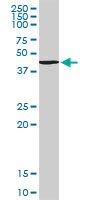ST1608 Sigma-AldrichAnti-TANK Rabbit pAb
This Anti-TANK Rabbit pAb is validated for use in Immunoblotting for the detection of TANK.
More>> This Anti-TANK Rabbit pAb is validated for use in Immunoblotting for the detection of TANK. Less<<同義語: Anti-TRAF Associated NF-κB Activator
お勧めの製品
概要
| Replacement Information |
|---|
主要スペック表
| Species Reactivity | Host | Antibody Type |
|---|---|---|
| H | Rb | Polyclonal Antibody |
価格&在庫状況
| カタログ番号 | 在庫状況 | 包装 | Qty/Pk | 価格 | 数量 | |
|---|---|---|---|---|---|---|
| ST1608-100UGCN |
|
100 μg |
|
— |
| References |
|---|
| Product Information | |
|---|---|
| Form | Liquid |
| Formulation | In PBS, pH 7.2. |
| Positive control | Human liver tissue |
| Preservative | None |
| Quality Level | MQ100 |
| Biological Information | |
|---|---|
| Immunogen | Full-length, human TANK (aa 1-119) |
| Immunogen | Human |
| Host | Rabbit |
| Isotype | IgG |
| Species Reactivity |
|
| Antibody Type | Polyclonal Antibody |
| Physicochemical Information |
|---|
| Dimensions |
|---|
| Materials Information |
|---|
| Toxicological Information |
|---|
| Safety Information according to GHS |
|---|
| Safety Information |
|---|
| Product Usage Statements |
|---|
| Packaging Information |
|---|
| Transport Information |
|---|
| Supplemental Information |
|---|
| Specifications |
|---|
| Global Trade Item Number | |
|---|---|
| カタログ番号 | GTIN |
| ST1608-100UGCN | 04055977223644 |
Documentation
Anti-TANK Rabbit pAb (M)SDS
| タイトル |
|---|








